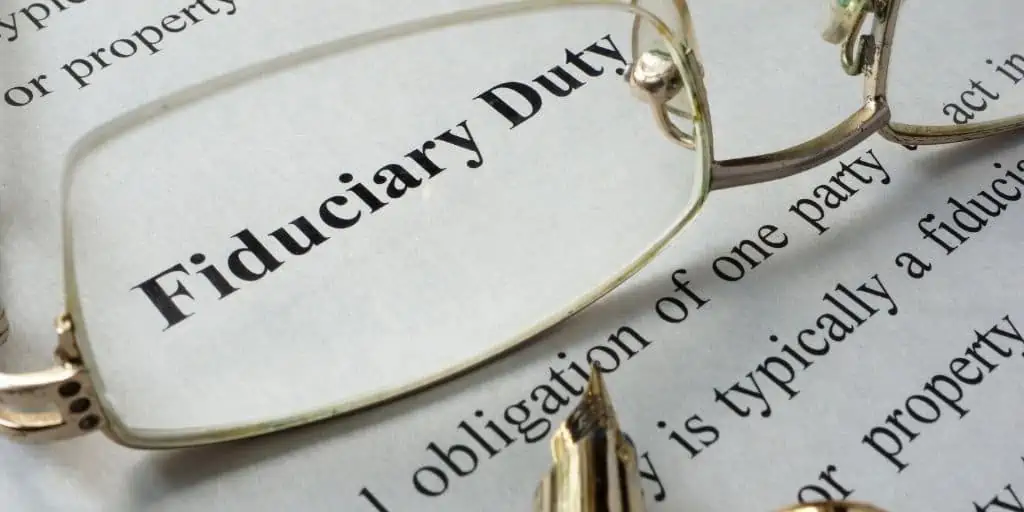What Is a Fiduciary?
REtipster does not provide legal advice. The information in this article can be impacted by many unique variables. Always consult with a qualified legal professional before taking action.
What Are the Fiduciary Duties of a Real Estate Agent?
In real estate, a fiduciary relationship is one between an agent (a broker or any real estate professional who represents a property buyer or seller) and a client (referred to as the principal).
Fiduciary comes from the Latin root word fidere, which means “entrust.” In this context, a real estate agent is bound to make a good-faith effort to uphold a client’s best interests at any given time, especially when it comes to legal matters.
Here are six fiduciary duties[1] every real estate agent must perform.
Accounting
The agent must account for all of the funds, assets, and documents entrusted to them. This duty compels the agent never to mix their personal and business money with funds related to the principal’s transactions and affairs.
Confidentiality
The agent must keep the principal’s secrets at all costs.
The seller’s agent should not broadcast the lowest price the principal is willing to take or how desperate the principal is to let go of the property.
The buyer’s agent should not reveal the highest price the principal can accept, nor should they disclose the prospective properties the principal loves.
Disclosure
The agent must share all of the material facts[2] they know with the principal. Revealing this information can benefit the principal at the negotiating table.
Loyalty
The agent must be loyal to their principal and their principal only. This duty bars an agent from acting in favor of anybody’s interests, including their own.
Obedience
This duty dictates that an agent must obey all lawful instructions of the principal. “Lawful” is the operative word. Therefore, the agent is under no obligation to follow the principal’s orders when they violate the law.
Reasonable Care
The agent must use all their abilities to serve the principal. They are expected to perform their duty competently at all times.
Where Does a Fiduciary Relationship End?
The end of a fiduciary relationship would depend on the written agreement between the agent and the principal.
However, when no written agreement or clause spells the end of such a relationship, the fiduciary duties the agent owes to the principal cease when:
- The brokerage agreement[3] expires.
- The brokerage agreement completes.
- Either party terminates the brokerage agreement.
When it comes to the termination of the brokerage agreement, the desire to execute such an event should be in writing.
Ideally, the sending party should use all mailing methods possible to send the termination letter to the current address of the receiving party. The agent must keep a copy of the letter and the envelope confirming the mailing address in file.
The end of a fiduciary relationship does not necessarily free the agent from all of their duties to the principal.
The agent should still account for all the funds, assets, and documents related to the transaction. Also, the agent should keep private information acquired during the brokerage agreement confidential even after the fiduciary relationship ends.
Common Breaches of Fiduciary Duty
A breach of fiduciary duty can be any act that damages the interests of the principal.
It is irrelevant if the effects of such an action are immediate or gradual or if the motivation behind it is meant well; a breach of fiduciary duty is serious. An honest mistake or a sheer moment of incompetence can have long-term consequences to the principal.
The following are typical breaches of fiduciary duty:
- Representing the buyer and the seller covertly in the same transaction. Also known as dual agency[4], dual representation is not illegal, but it is unethical when undisclosed to either or both parties.
- Accepting kickbacks[5]. This practice involves taking any gift from another party to guarantee a particular outcome to the deal. The condition attached to such ill-gotten compensation undermines the principal’s chances of getting the most favorable deal.
- Staying mum about a house defect. A broken roof, a leaky window, or a faulty HVAC system is a material fact the property buyer must be fully aware of. If the agent knows about any house defect and fails to point it out, the principal can hold the agent accountable for the non-disclosure.
- Forgetting to inform the principal about other offers. Even if the seller accepts an offer, the agent should still bring up any new ones on the table. Failure to mention them is a betrayal of the principal’s trust.
- Turning down or saying yes to an offer without the principal’s consent. The agent represents the principal, but it does not mean they can act of their own volition. The agent should run everything past the principal. The principal is the decision-maker; the agent is merely a facilitator.
Can the Principal Sue the Agent?
Breaching a fiduciary duty is grounds for getting sued. Consulting a real estate lawyer can help the charging party understand the full extent of an agent’s responsibilities and proceed with the legal action.
What Are the Common Penalties for Fiduciary Abuse?
Some breaches of fiduciary duty can carry criminal penalties. However, prosecutors do not always have the resources to go after real estate agents accused of any serious form of fiduciary abuse. That is why the defendants are usually tried in civil courts.
If found guilty of fiduciary abuse, a real estate agent may face any of the following penalties:
Restitution
The court may require the defendant to pay what the plaintiff lost as a direct consequence of the breach of fiduciary duty. The point of awarding compensatory damages[6] is to make the plaintiff “whole” as though the abuse did not happen.
Punitive Damages
The court may decide that it is not enough for the defendant to make restitution. They can order the guilty party to pay a higher amount as a form of graver punishment for the wrongdoing.
Double or Triple Damages
Under specific laws, the defendant may have to pay double or triple the sum of compensatory damages.
Reimbursement of Fees and Costs
The court may order the guilty party to cover the attorney’s fees, expert witness fees, and the costs[7] related to the lawsuit.
Ouster
In addition to getting removed from post, a real estate agent guilty of breaching fiduciary duty may also lose their license[8].
What If the Legal Damages Are Insufficient or Unavailable?
If legal damages are not enough or not available, the court may offer equitable relief. The following are the equitable remedies the harmed principal may obtain:
Specific Performance
With this equitable remedy, the guilty party must complete a certain action. Courts allow this form of relief under specific circumstances. Specific performance may be applied when the case meets two criteria:
- The breached component of the contract is unique.
- The monetary reward is inadequate.
It is up to the plaintiff to prove whether the breached aspect of the contract satisfies the definition of unique. However, specific performance is out of the question when various and continuous acts are contractually required.
Contract Rescission and Reformation
This equitable remedy cancels the old breached contract (rescission) and creates a new one (reformation). Its objective is to draft a fresh agreement that reflects the wishes of and addresses the needs of both parties.
Rescinding a contract is an opportunity to start over, as if the original written agreement was never signed at all.
Usually, courts take this route when a term or clause in the contract is wrong or misrepresented. Cases involving fraud or both parties committing mistakes with the original contract call for this remedy. That is why it can also be called rectification.
Takeaways
- A fiduciary is any party that acts on behalf of another and upholds the client’s best interests at all times.
- In real estate, a fiduciary is any professional representing a property buyer or seller (called principal). A fiduciary must handle the funds, assets, and documents entrusted to them, disclose known material facts, keep the principal’s sensitive information confidential, and provide reasonable care from start to finish.
- Abuse is one of the reasons a real estate fiduciary relationship ends, while dual representation, failure to mention property damage, and independent decision-making are common breaches of fiduciary duty. Various penalties await guilty real estate agents, ranging from compensatory damages to license revocation.
Sources
- National Association of REALTORS®. (2013.) Fiduciary Duties. Retrieved from https://www.nar.realtor/sites/default/files/handouts-and-brochures/2014/nar-fiduciary-duty-032213.pdf
- Kimmons, J. (2020.) What Is a Material Fact? The Balance Small Business. Retrieved from https://www.thebalancesmb.com/material-fact-in-a-real-estate-transaction-2866907
- Phipps, M. (2020.) Real Estate Brokerage Agreement. SF Gate. Retrieved from https://homeguides.sfgate.com/real-estate-brokerage-agreement-60454.html
- Trulia. (2018.) What Is Dual Agency? (And Why You Should Beware). Retrieved from https://www.trulia.com/blog/what-is-dual-agency/
- CA Realty Training. (2020.) Real Estate Agent Kickbacks: What Are They? Retrieved from https://www.carealtytraining.com/real-estate-agent-kickbacks/
- FindLaw. (2016.) What Are Compensatory Damages? Retrieved from https://www.findlaw.com/litigation/legal-system/what-are-compensatory-damages.html
- Legal Information Institute. (2020.) Court Costs. Retrieved from https://www.law.cornell.edu/wex/court_costs
- Coleman, J. (2020.) How Can a Real Estate Agent Lose Their License? RealEstateCareerHQ.com. Retrieved from https://realestatecareerhq.com/how-can-real-estate-agent-lose-license/













